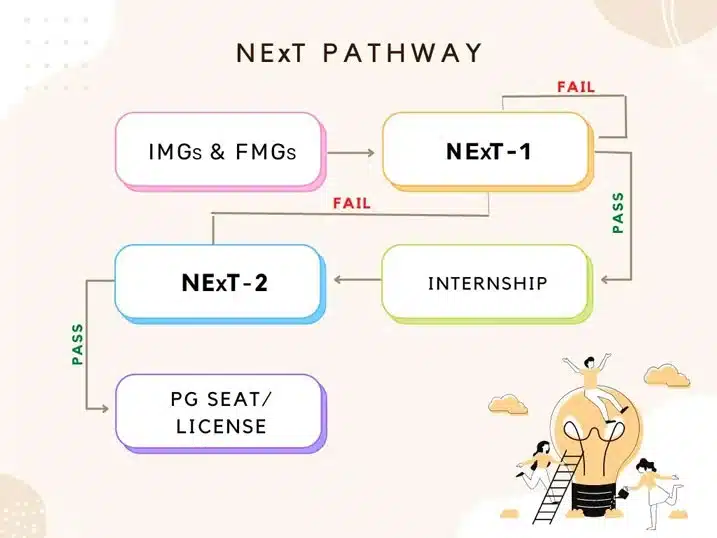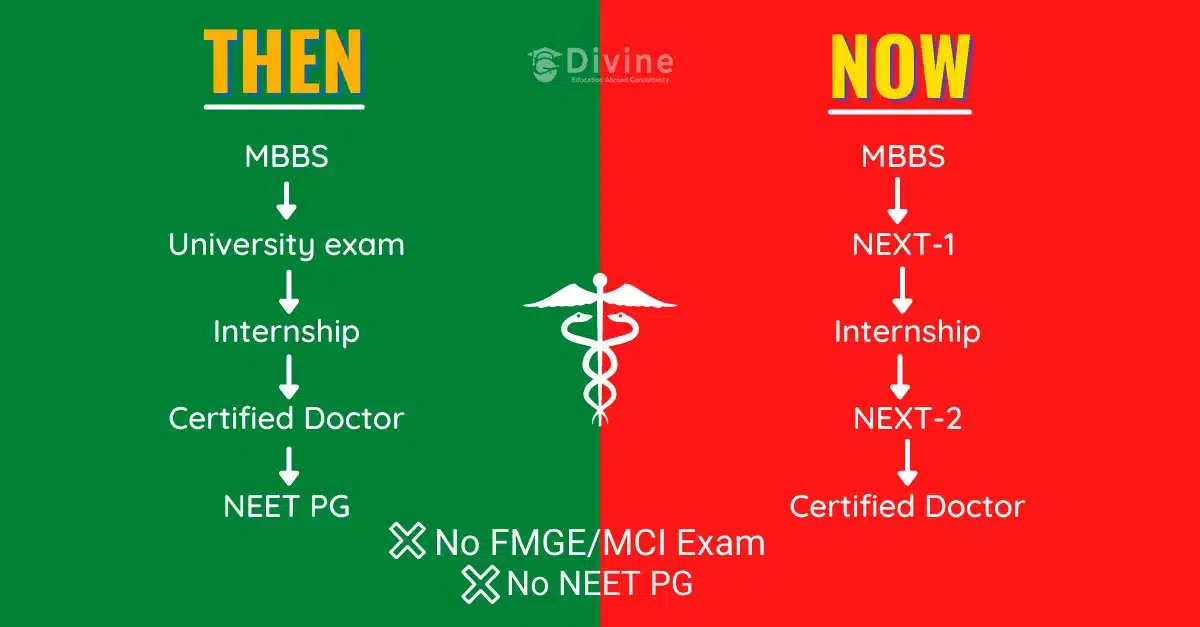Firstly, You need to know ask yourself this…
Will NExT Affect you?
Short answer is, YES – This will affect
- Every MBBS Student in India (from 2025)
- All Students who go abroad to Study MBBS and come back to India
- Any other person holding a Medical Degree who wished to pursue an academic course

Exception: Who will it not Affect?
(meaning – The following will not need to write NExT or FMGE)
- Students who Complete Residency in the USA/UK/Canada
NMC (National Medical Commission or the erstwhile Medical Council of India) has the following information on their official site.
You may click the link below and check it out yourself.
A person seeking provisional or permanent registration shall not have to qualify the Screening Test if he/she holds an Undergraduate medical qualification from Australia/Canada/New Zealand/United Kingdom/United States of America and the holder thereof also been awarded a Post Graduate medical qualification in Australia/Canada/New Zealand/United Kingdom/United States of America and has been recognized for enrolment as medical practitioner in that country.
Source: https://www.nmc.org.in/information-desk/for-students-to-study-in-abroad/
How will NExT affect you?
You need to understand that this one exam is going to replace
- MBBS Final Exams
- NEET PG (National Eligibility-cum-Entrance Test for postgraduate seats)
- FMGE (Foreign Medical Graduate Examination)
To understand in depth about how this affects you..
First.. know that only 20% of FMG, Foreign medical graduates (Students who go to countries like Russa/China/bangaladesh etc..) come back to india & are able to Clear the Exam.
According to the data shared by NBE, a total of 38,535 candidates appeared for the screening exam. 30,046 candidates failed the screening test and 1,386 students did not appear for the exam. Results of 15 candidates have been withheld as the face ID/documents are pending for verification of these candidates. The passing percentage for the FMGE 2023 December session is around 20.57%.

Nearly 80% per cent students who pursued medical education from abroad have failed the exam. The pass percentage in the Foreign Medical Graduate Examination has always remained relatively low.
The FMG students who are are completing MBBS abroad in countries like Russia, China, Bangladesh etc.. and coming back to India, Only 20% are even qualifying FMGE.
Why is the pass percentage so low?
According to Experts..
- Lack of Clinical Exposure: Many international medical schools suffer from inadequate infrastructure, leading to insufficient clinical training. Students often do not train in hospitals, crucial for practical experience.
- Substandard Medical Education: The educational quality at some foreign medical colleges is considered below the standard required for practicing medicine effectively in India.
- Inadequate Patient Interaction: Students from these institutions miss out on essential patient exposure, depriving them of critical hands-on experience needed for medical practice
Concerns Over Exam Difficulty
Experts oppose lowering the licensing exam’s difficulty as it could lead to unqualified doctors entering the profession, compromising healthcare quality.
Since they don’t qualify FMGE – They are not eligible/allowed to write NEET PG.
As of now, Only those who qualify FMGE (<20%) are competing to secure a PG Seat.
Why should you be concerned?
When NExT replaces FMGE & NEET PG, All the students completing MBBS in INDIA or Abroad will directly be eligible to write NExT
means, every one will have a equal chance to qualify and to even apply for PG.
However..
The number of Postgraduate Seats Available is not going to increase all of a sudden.

IF this does not raise a concern for you yet, know that the number of students appearing for NEET PG is increasing every year.

Is this number going to increase after implementation of NExT?
Absolutely..
How?
Simply cause more FMG’s will be directly eligible to write NExT.

This means the the competition to secure a PG seat is going to get much much harder in the coming years.
If you pursue medicine in the US/UK and complete your Residency (PG) there (since PG there is free and.. you get a good stipend to study/work as a PG student unlike India)
You can come back to India and Practice without writing NExT/FMGE..
I have already covered the difference in cost of education for the entire journey in one of the previous mails.. if you didn’t receive it.. you can reply to this mail requesting the information & my team will send it to you.
Whenever you feel you’re ready to start your Medicine Joruney to becoming a Doctor in the US, we are there to help you..
If you ask me when is the right time to start? The answer is NOW!
What is NExT and who will it affect?
NExT (National Exit Test) will affect all MBBS students in India from 2025, students studying MBBS abroad who wish to practice in India, and anyone seeking to pursue further academic medical courses in India. It replaces MBBS final exams, NEET PG, and FMGE.
Who is exempt from taking the NExT exam?
Graduates with an undergraduate medical degree and a postgraduate qualification from Australia, Canada, New Zealand, the UK, or the USA, recognized in those countries, will not need to qualify for NExT or FMGE to practice in India.
How will NExT impact foreign medical graduates?
NExT will allow all foreign medical graduates, including those from countries like Russia, China, and Bangladesh, who traditionally have a low pass rate in FMGE, to be eligible for postgraduate seats in India, potentially increasing competition.
Why is the FMGE pass rate so low for students from certain countries?
The low pass rate for FMGE among students from countries like Russia, China, and Bangladesh is often attributed to inadequate clinical exposure, substandard medical education, and insufficient patient interaction.
What will the competition for postgraduate medical seats in India look like with the introduction of NExT?
With NExT making all MBBS graduates eligible for postgraduate studies, the competition for limited PG seats in India is expected to intensify, as the number of candidates, including foreign medical graduates, will increase.












